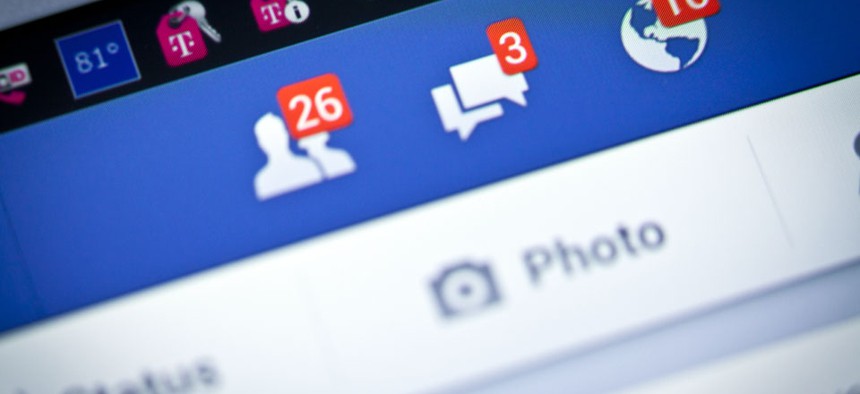What’s at the Root of Your Facebook Addiction? Numbers

JaysonPhotography/Shutterstock.com
The Facebook Demetricator shows we like liking a little too much.
A "like" on Facebook is a treat. You get a little red pop-up on your notifications icon, you see the little box on the lower-left corner of your screen describing the like, and you get that warm, albeit fleeting sense of pride. Someone liked your post. Your post! You savor it. You inevitably want more likes. You wait.
To keep its 1.3 billion users clicking and posting (and stalking), Facebook scatters numbers everywhere. While it collects many metrics that users never see, it tells users plenty of others, too. Facebook tells you the number of friends you have, the number of likes you receive, the number of messages you get, and even tracks the timestamp to show how recently an item entered the news feed.
And these numbers, programmer and artist Ben Grosser argues, directly influence user behavior by being the root of Facebook addiction. In October 2012, he set out to find exactly what Facebook's metrics were doing to users after noticing how much he depended on them.
"There were times when I was more focused on the numbers than the content itself," he remembers. "I was more interested in how many likes I had instead of who liked it. I realized every time I logged in I looked at those numbers. Why was I caring? Why do I care so much?"
In response, he built a browser extension called The Facebook Demetricator, which, when installed and activated, hid all numbers on Facebook. Instead of seeing the little red pop-up showing the number of notifications you have, you'd simply see the icon take on a lighter blue color. Instead of seeing the number of likes a post received, you'd see the phrase "people like this."
Since releasing the extension two years ago, more than 5,000 users have adopted the tool, sending Grosser feedback on how the tool influenced their understanding of the social network. Grosser used their observations to write a paper examining the impact of metrics, published Monday in the journalComputational Culture.
His findings are illuminating. Sure, Facebook addiction is probably the oldest social-network-related epidemic, but Grosser's tool allowed users to experience a pressure-free Facebook. This experience demonstrated that metrics changed user behavior by encouraging competition (the more likes, the better), emotional manipulation (deleting posts when there weren't enough likes), reaction (liking more recent posts instead of older ones), and homogenization (liking because others liked).
Put simply, the numbers encouraged users to feel compelled to want more numbers. For example, friend count is seen as a mark of status because Facebook places a small "+1" next to the "Add Friend" button. Even if the user isn't aware of doing so, the number encourages her to make more connections, because she's shown that adding a friend is a positive action. That results in an overall and innate need for more on Facebook.
The more competition, the more the numbers matter, creating a vicious cycle that eventually creates what Grosser calls the "graphopticon" model, where the many watch the many. You log on, see how many likes other posts have received, and feel compelled to like as well. Facebook users therefore contribute data while pressuring others to do the same.
Which is why many users of Grosser's Demetricator tool found it difficult to leave the numbers behind.
"People realized when the numbers were gone, they had been using them to decide whether to like something," he tells me. "I certainly didn't expect these tendencies of people saying, 'I literally don't know what to do [without knowing the metrics].'"
Some Demetricator users rejected the tool completely, seeing it as going against the benefits of using Facebook in the first place.
"A huge category of response was, 'Why would I want to [hide the numbers]? The numbers are the whole point,'" Grosser says. "Some people really like their metrics."
It's not just Facebook where users have been conditioned to appreciate more notifications and likes. On Instagram, the hashtag #100likes is applied to photos that, well, achieve at least 100 likes, a mark of success used mainly among teens competing to enter "The 100 Club." Twitter prominently places the follower count at the top of users's profiles, and tracks the number of retweets and favorites. Even Ello, which has promised it won't involve advertisers, displays timestamps and the number of views.
Not all users of the Demetricator found the lack of numbers paralyzing. Instead, most continued using the tool, finding it "enjoyable that their emotional well-being was restored to some extent," Grosser says. No numbers, no pressure.
But whatever the outcome, the influence of the Demetricator is clear: The numbers made a difference in the way people used Facebook, often affecting their behavior. Which, Grosser says, isn't necessarily a bad thing. His project served only as an experiment reminding users to think about why metrics matter.
"I think it's a problem when we don't know what those likes mean, when we start focusing on wanting more likes," he says. "If we aren't aware of how these numbers are telling us to interact, then it's a problem."
And perhaps that's where users are already headed. As users become more aware of news posts and advertisements catered to their preferences, they seek alternatives to avoid that control.
Or they'll just keep liking those likes. Because even if we are conditioned to want them, likes still don't have to mean anything at all. They can remain treats, tidbits of gratification used only on social media. It's an idea Grosser had once previously toyed with in another project called "Reload the Love," which allowed users to see their notification count go up, just for the satisfaction of seeing the engagement. He found then, just as he found with the Demetricator, that the smallest numbers deeply affected the way users felt.
(Image via JaysonPhotography/Shutterstock.com)





